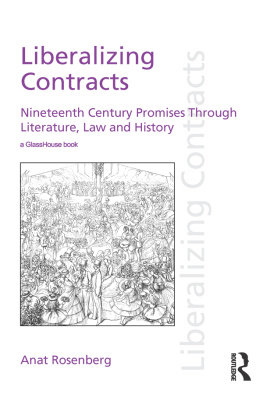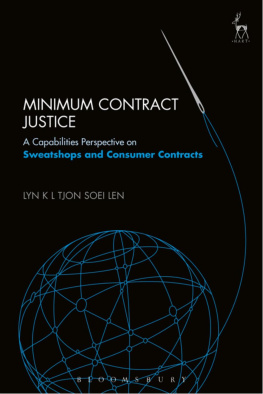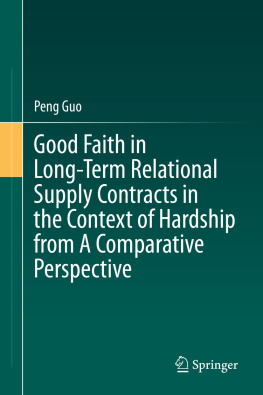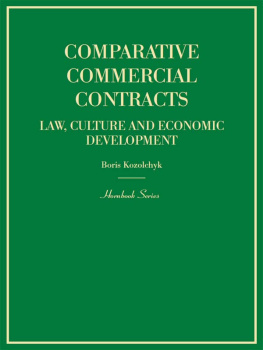Liberalizing Contracts
In Liberalizing Contracts Anat Rosenberg examines nineteenth-century liberal thought in England, as developed through, and as it developed, the concept of contract, understood as the formal legal category of binding agreement, and the relations and human practices at which it gestured, most basically that of promise, most broadly the capitalist market order. She does so by placing canonical realist novels in conversation with legal-historical knowledge about Victorian contracts. Rosenberg argues that current understandings of the liberal effort in contracts need reconstructing from both ends of Henry Maines famed aphorism, which described a historical progress from status to contract. On the side of contract, historical accounts of its liberal content have been oscillating between atomism and social-collective approaches, missing out on forms of relationality in Victorian liberal conceptualizations of contracts which the book establishes in their complexity, richness, and wavering appeal. On the side of status, the expectation of a move from status has led to a split along the liberal/radical fault line among those assessing liberalisms historical commitment to promote mobility and equality. The split misses out on the possibility that liberalism functioned as a historical reinterpretation of statuses particularly gender and class rather than either an effort of their elimination or preservation. As Rosenberg shows, that reinterpretation effectively secured, yet also altered, gender and class hierarchies, there is no teleology to such an account.
Dr. Anat Rosenberg is an Assistant Professor (Lecturer) at the Radzyner Law School, The Interdisciplinary Center (IDC) Herzliya, Israel. She had been a visiting research fellow at Columbia Law School, and is currently a visiting scholar at the Faculty of History at Cambridge University, and a visiting fellow at the Institute of Advanced Legal Studies, the University of London. Her research brings together law, literature, sociology and cultural studies, to study the history of late modern capitalism.
Discourses of Law
Series editors: Peter Goodrich, Michel Rosenfeld and Arthur Jacobson
Benjamin N. Cardozo School of Law
This successful and exciting series seeks to publish the most innovative scholarship at the intersection of law, philosophy and social theory. The books published in the series are distinctive by virtue of exploring the boundaries of legal thought. The work that this series seeks to promote is marked most strongly by the drive to open up new perspectives on the relation between law and other disciplines. The series has also been unique in its commitment to international and comparative perspectives upon an increasingly global legal order. Of particular interest in a contemporary context, the series has concentrated upon the introduction and translation of continental traditions of theory and law.
The original impetus for the series came from the paradoxical merger and confrontation of East and West. Globalization and the internationalization of the rule of law has had many dramatic and often unforeseen and ironic consequences. An understanding of differing legal cultures, particularly different patterns of legal thought, can contribute, often strongly and starkly, to an appreciation if not always a resolution of international legal disputes. The rule of law is tied to social and philosophical underpinnings that the series has sought to excoriate and illuminate.
A full list of titles in this series is available at:
www.routledge.com/law/series/SE1036
Masculinity and the Trials of Modern Fiction
Marco Wan
A Mosaic of Indigenous Legal Thought
C.F. Black
The publisher gratefully acknowledges the support of the Jacob Burns Institute for Advanced Legal Studies of the Benjamin N. Cardozo School of Law to the series Discourses of Law.
Liberalizing Contracts
Nineteenth Century Promises Through
Literature, Law and History
Anat Rosenberg
First published 2018
by Routledge
2 Park Square, Milton Park, Abingdon, Oxon OX14 4RN
and by Routledge
711 Third Avenue, New York, NY 10017
A GlassHouse book
Routledge is an imprint of the Taylor & Francis Group, an informa business
2018 Anat Rosenberg
The right of Anat Rosenberg to be identified as author of this work has been asserted by her in accordance with sections 77 and 78 of the Copyright, Designs and Patents Act 1988.
All rights reserved. No part of this book may be reprinted or reproduced or utilised in any form or by any electronic, mechanical, or other means, now known or hereafter invented, including photocopying and recording, or in any information storage or retrieval system, without permission in writing from the publishers.
Trademark notice: Product or corporate names may be trademarks or registered trademarks, and are used only for identification and explanation without intent to infringe.
British Library Cataloguing-in-Publication Data
A catalogue record for this book is available from the British Library
Library of Congress Cataloging-in-Publication Data
A catalog record for this book has been requested
ISBN: 978-1-138-92370-6 (hbk)
ISBN: 978-1-315-68488-8 (ebk)
Typeset in Baskerville by
by FiSH Books Ltd, Enfield
Contents
PART I
From Status
PART II
With Status
Acknowledgements tend to begin with talk about accumulated debts. In a book on contract there is a strange irony in using the language of debt, yet this studys findings actually sooth the irony, for they tell a story about relationships, with their hopes and suffocations. The debts I want to acknowledge have been all hope to me (as Victorians debts were not to them), but have often suffocated others who have been generous enough to be involved in this book. I hope they will sense their share in it, and forget all suffocation.
This book began in my PhD. Like a child it is now both strange to its early stages and constituted by them. The intellectual friendship and keen interest I enjoyed then and since have been a sin qua non for whatever it is now.
From early on I enjoyed the mentorship of three wonderful intellectuals and friends. The remarkable Roy Kreitner has been there from the beginning. A reader both demanding and generous, ever able to move between minute detail and overarching vision even when I was not, and never tired of intellectual exchange, my work would not have taken the routes it has without his wisdom, and would have been all the worse for it. Ayelet Ben-Yishai has been indispensable to this study from the day I met her. A brilliant Victorianist and skillful reader, she has offered insight and perspective which have inspired me these past years and challenged me to make this study the best I can. Uriel Procaccia early on initiated me into the cultural study of law. I owe that early choice to him, and he saw me through with unflinching support.
My colleague and friend Galia Schneebaum has attended this study from its early iterations when we were both just finding our ways through academia. She has thought and astutely commented on different parts more times than I can remember, always improving my work. My many conversations about this study with Galia, and with Eliav Lieblich, Moran Ofir, and Adam Shinar at IDC have become part of this book. They have all been both willing listeners and voices of reason. Other colleagues and friends at IDC have enriched my work. I am particularly grateful to Lior Barshack, Amnon Lehavi and Yoram Shachar, who have generously commented on various parts and often shared in my dilemmas. I am also grateful to Avinoam Cohen, Hanoch Dagan, Amos Israel, Assaf Likhovski, Menachem Mautner, Christopher Tomlins, Avishalom Westreich, and Steven Wilf for offering their advice and intellectual acumen at various stages. The two readers of my PhD, Nan Goodman and Bernadette Meyler, had early on shared knowledge and advice which informed and encouraged my work on this book.










